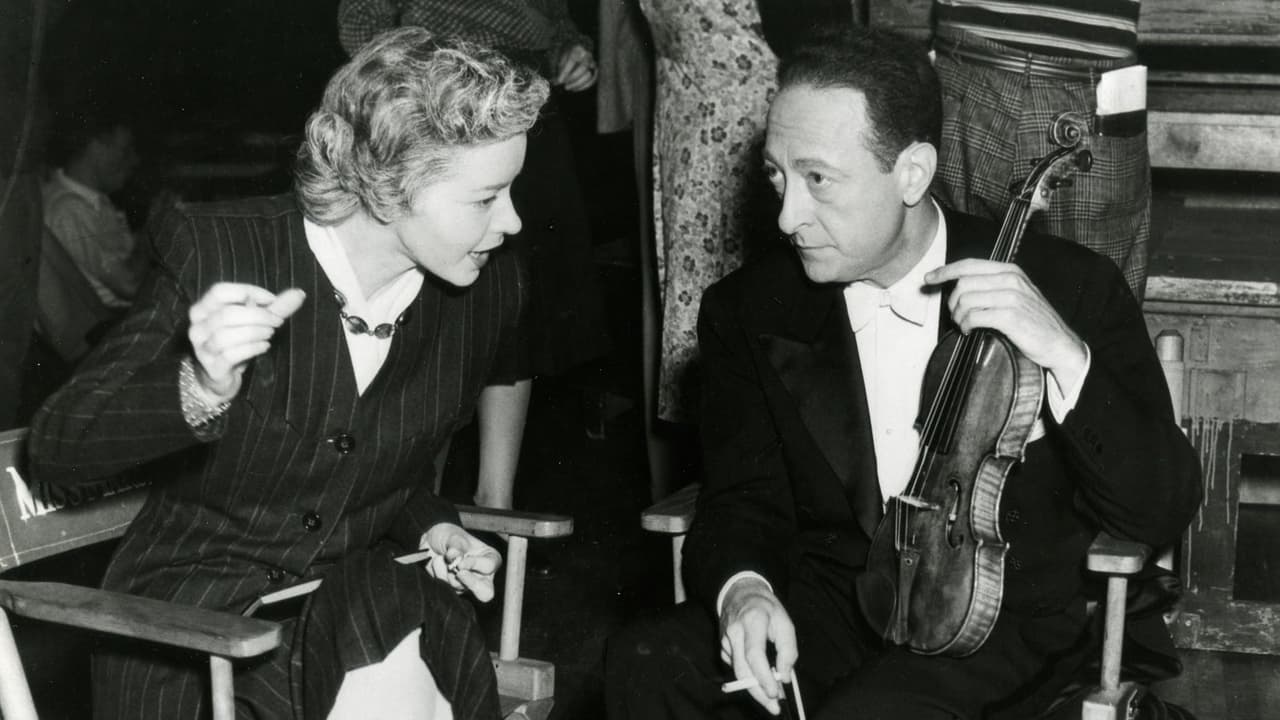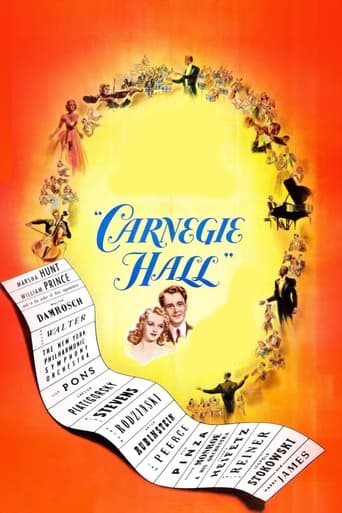Colibel
Terrible acting, screenplay and direction.
InformationRap
This is one of the few movies I've ever seen where the whole audience broke into spontaneous, loud applause a third of the way in.
Dirtylogy
It's funny, it's tense, it features two great performances from two actors and the director expertly creates a web of odd tension where you actually don't know what is happening for the majority of the run time.
Claire Dunne
One of the worst ways to make a cult movie is to set out to make a cult movie.
clanciai
The meaning of the film gets drowned in the overwhelmingly good performances of the artists, and there are any number of them: they are all there, Artur Rubinstein, Jasha Heifetz, Gregor Piatigorsky, Leopold Stokowski, Bruno Walter, Artur Rodzinski, Fritz Reiner, Ezio Pinza, Lily Pons and even Tchaikovsky (vaguely discerned from some distance, impersonated, of course,) and although Marsha Hunt makes a good and touching performance as the mother who loses first her husband and then her son in the same way - getting lost making their own ways - the superficial acting of that story must drag the film down from the top levels of the performances. The key scene to the whole thing is however Jasha Heifetz' communication with Marsha, when he eloquently comforts her for all her grief better than anyone could have done.The personality of Jasha Heifetz is somehow the key to the whole problem, which is the alienation of the artist from an ordinary human life, which is what both the father and the son can't bear and rebel against. Jasha Heifetz was often considered inhuman in his seemingly callous attitude, and even in his acting here he gives a rather stiff and almost robot-like impression, but his words couldn't be warmer, and they could but come from the heart, which still beats down there under all the layers of superhuman professionalism and completely reconciles Marsha (Nora) with her fate. Edgar G. Ulmer made some very odd films in extremely different directions, there is one film about tuberculosis and another horror film with Boris Karloff and Bela Lugosi, which could be their best - and here he films music, and as a music film of music and about music it will certainly endure for all ages and continue to impress all lovers of real music.
Beginthebeguine
Taken from an idea by Silent Screen Star Seena Owen low budget director Edgar G. Ulmar pays homage to classical music and captures the performances of many of the greatest living soloist and conductors of the 1940's. The plot is simple and somewhat sweet. Cute little Irish immigrant moves to the New York during the opening of the great hall. By coincident her aunt works there and she is allowed to watch the performance. Struck by it's beauty, she develops a life-long obsession with Carnegie Hall; where she eventually begins work as a cleaning woman. She marries a pianist, and during the weakest part of the script they shoot from many years of bliss to a marriage ending fight when he decides to quit the Hall. Conveniently, he falls down the stairs drunk and dies. While their son is growing up mom continues to guide his life toward The Hall. Studying, practicing finally becomes a burden for him and in his late teens or early twenties meets a young singer and he runs off with her and joins a dance band. Time goes by and our mom has become old, she has risen through the ranks of Carnegie Hall and has become rich, but she does not have her son. She realizes that she has made mistakes and when the young wife of her son asks for her help she rushes to make everything alright...of course we end up back at The Hall for a happy ending. All this is merely decoration for the directors true purpose, the music and the artists. I had the chance to meet Marsha Hunt many years ago when I was a young man in L.A. She was a very pleasant women and still attractive, but I never had any idea how beautiful she was as a young woman. She is stunning and her talent is no less so. I am not amazed that such a talent is lost in early Hollywood. I have heard so many stories about similar destruction of great talent, by less talented studio heads of the time. They had no idea what to do with intelligent and talented women. It was all of our loss, however, that Ms. Hunt was not able to command a career that would have been fitting. In this movie, she alone carries the story. As ridiculous as the script is, and the ton of plot holes she makes the film watchable when the musicians are not on screen.
Ed
The dramatic part of the film is really rather dismal. When you have the mother in the cast played by a woman (Marsha Hunt, a later victim of the Hollywood blacklist, still alive at 95!) who, in real life was younger than her "son" (William Prince), it strains credibility even with Miss Hunt's "old" makeup.And the usual device of the hero's desire to play "modern"-music-rather-than-classical device is one that surely had whiskers even then! See "The Jazz Singer" for example. In this case, he wants to perform with the rather wooden singer, band leader and trumpeter Vaughn Monroe.Mr. Prince's character, Tony Salerno finally gets his predicable "big chance" at the end of the film when he "conducts", "plays" his own composition with trumpeter Harry James. It isn't clear who really wrote the music from the listed credits but the anonymity of the author is quite understandable. (Charles Previn?) And none of the other composers suffers from the competition, I have to say.However, the actual musical performances are as well done as possible with Rubenstein and Heifetz at somewhere near their peaks even with Rubenstein's inevitable Polonaise in Ab (Chopin). And their interactions with the actors is also very well done with, for example, Pinza's "prima donna" temper tantrum about his costume probably not exaggerated at all.Walter Damrosch's association with the actual opening of Carnegie Hall at which Tchaikovsky also conducted is another welcome reminder of the authenticity of the film as well as the actual hall being used rather than a studio fake and that right after its 1940's renovation.Though my last piano teacher, Nadia Reisenberg was also in the film in an ensemble, I turned it on too late to see her.A unique film for the music even with the cringe-making back story!
Neil Doyle
If you love classical music, CARNEGIE HALL will give you an earful. Some of the great performers of the time are seen in concert, such as Leopold Stokowski conducting Tchaikovsky's "Symphony in E Minor," Artur Rubenstein doing Chopin's "Polonaise" and "The Ritual Fire Dance" at the piano keyboard, Jascha Heifetz and his nimble fingers on the violin for Tchaikovsky's "Concerto for Violin," all performed brilliantly and making for a memorable soundtrack.But the story is a mawkish affair--MARSHA HUNT wanting her son to be a concert pianist who will some day play at Carnegie Hall, while he has other plans that include the world of modern music. When he joins the Vaughan Monroe band, mother and son sever their relationship and the rest of the tale treads the predictable movie line of many a backstage musical with no inspiration from the screenwriter.It doesn't help that Hunt's age make-up is as artificial as the thin plot that is supposed to hold all of this music together. WILLIAM PRINCE as her son makes almost no impression and MARTHA O'DRISCOLL is merely eye candy as the girlfriend who becomes his wife.If only the producers had a script worthy of all this music. RISE STEVENS does a nice job on an aria from "Carmen" and LILY PONS gets to do her famous "Bell Song," but neither of these acts are staged as more than "get up to the mike and sing." EZIO PINZA and JAN PEERCE are a bit luckier in the staging of their arias.Music lovers will certainly appreciate all the musical bits, some of which go on for quite a lengthy time while what little plot there is comes to a complete standstill.A feast for the ears, but not much can be said about the film itself which is more like a test of endurance over two hours and sixteen minutes of running time.Trivia note: All of the performing scenes were actually filmed at the newly refurbished Carnegie Hall.

